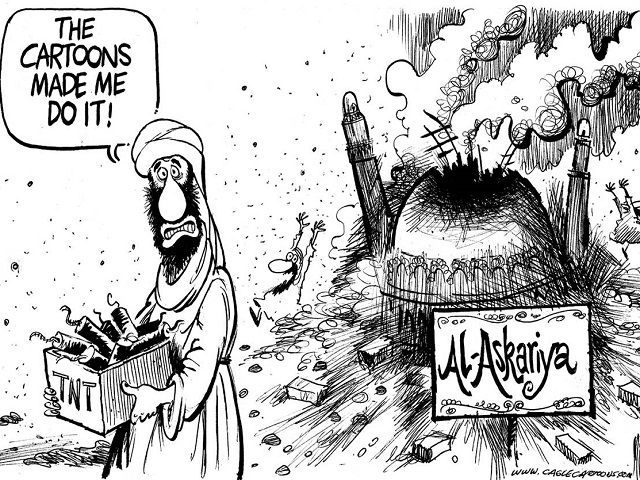If the recent violent attack at Garland, Texas, reminds us of anything about Islam, it is that lampooning Muhammad is no laughing matter for radical Muslims—or even for moderate Muslims, for that matter.
In a recent Asia Times piece, economist David P. Goldman analyzes why Muslims—unlike Jews and Christians—have such a hard time poking fun at their prophets.
Goldman begins by reminding readers that no Muslim believes that Muhammad is God, or God’s son, but simply a prophet—a mouthpiece of Allah. This distinction is important, since Muhammad is comparable to Moses for Jews or Saint John the Evangelist for Christians, but not to Yahweh or Jesus Christ.
Muslims believe that Muhammad is the author of the Koran, as many Jews believe that Moses is the author of the Torah and many Christians believe that John is the author of a chunk of the New Testament, including one Gospel, three letters, and the Apocalypse (Book of Revelation).
It’s not that Christians and Jews take their religion less seriously, Goldman insists, or that the Bible and the Torah are less sacred in the Judeo-Christian tradition than the Koran is for Muslims. “If a Torah scroll is dropped accidentally during Jewish services, Jewish law binds the congregation to a month of fasting,” Goldman adds.
Yet for both Jews and Christians, God engages man in a dialogue and pushes for a response, at times even an argument, and humor “arises from the impossible tension between an infinite God and finite man,” he says.
This is so clearly the case that the Judeo-Christian tradition is almost unimaginable without the dimension of wit. “Humor is intrinsic to Christianity,” asserted the celebrated Danish theologian Soren Kierkegaard.
There is, in fact, nothing blasphemous about Jews making fun of Moses or Christians engaging in witticisms about Saint John, but for Muslims, “to make light of Muhammad is to impugn Allah.” Even though Muslims don’t believe that Muhammad was anything other than human, he becomes indistinguishable from the deity because his personality was subsumed into the sacredness of his role.
In essence, Goldman argues, the fundamental difference is that “there is no divine-human encounter in Islam, no revelation, only the selection of a human mouth as the loudspeaker by which Allah declares his Koran.” Because of this, Allah “remains utterly remote from humans, unconstrained in power and arbitrary in his actions.”
This rigid attachment to Allah’s arbitrary will and the blind reverence it inspires, Goldman suggests, not only eliminates any real development of doctrine; it also has more sinister consequences. He notes that the majority of Muslims in almost all the most populous Muslim countries believe that apostasy should be punished by death.
There is, to be sure, a vast difference between the many moderate Muslims who would never think of taking up arms against the organizers of a cartoon-drawing contest and the radical jihadists for whom immediate recourse to AK-47s is a knee-jerk reaction.
Nonetheless, Goldman proposes, the organizers of the Garland event, the Dutch politician Geert Wilders, and the anti-jihad activists Pamela Geller and Robert Spencer have made their point: “To placate Muslims in their resistance to modernity would require the West to give up being the West.”
Follow Thomas D. Williams on Twitter @tdwilliamsrome.

COMMENTS
Please let us know if you're having issues with commenting.